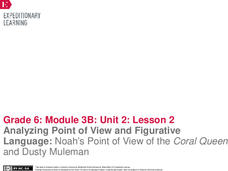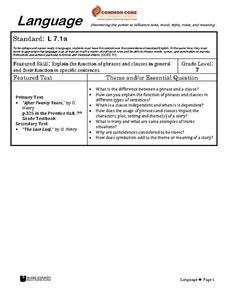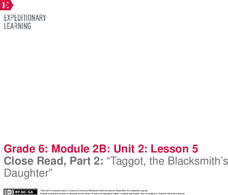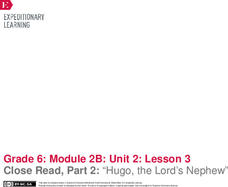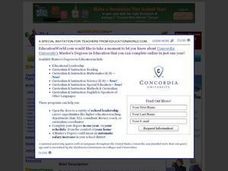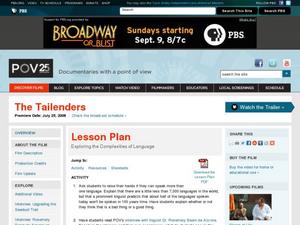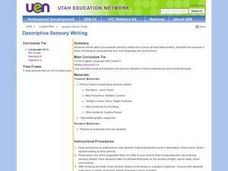EngageNY
Analyzing Point of View and Figurative Language: Noah’s Point of View of the Coral Queen and Dusty Muleman
Literally, what's the meaning? Scholars read pages seven through nine of Flush and discuss literal and nonliteral meaning with figurative language. Learners work in triads to identify and define unfamiliar words. They then complete a...
Curated OER
Language Arts: Telling a Painting's Story
Use art museum paintings as inspiration for your class's creative writing works. Observing the paintings closely, middle and high schoolers list details and write descriptions. Their completed stories are displayed on bulletin boards...
Curated OER
Spanish-English Cognates in the ELL Classroom: Friends or Foes?
Define the meaning of a cognate and use the concept to help Spanish-speaking ELLs connect their first language to English. Middle schoolers explore Latin roots to find cognates in both languages. They relate the Spanish and English word...
Prestwick House
New (March 2016) SAT Writing and Language Test Practice
Prepare class members for the SAT Writing and Language exam with a practice test that prepares students for the types of questions and the kind of language used in the exam. Test takers must select the best way to fix poorly...
Achieve3000
Context Clues and Idioms
Kids practice using five types of context clues (definition, synonym, antonym, example, and general) to decode idiomatic language.
Curated OER
Improving Speaking Skills in the Language Classroom
How can you create an "English-free" classroom for your foreign language learners? This year, use some of these strategies to maximize your students' opportunity to communicate in the language.
Wake County Public Schools
Language
Have your class doing everything from reading literature, analyzing literary devices, identifying independent and dependent clauses, discussing, and writing creatively with the rich resource found here. After a mini lesson on independent...
EngageNY
Close Read, Part 2: “Taggot, the Blacksmith’s Daughter”
It is just a figure of speech. Readers look for figurative language as they read Taggot, the Blacksmith’s Daughter. They complete a Figurative Language graphic organizer by recording and identifying the types of figurative...
ESL Kid Stuff
Christmas Lesson 1
Little ones sing Christmas carols, complete craft projects, and play word games while learning new vocabulary in part one of two-part ESL activity series.
ESL Kid Stuff
Christmas Lesson 2
Wrapping presents, singing Christmas carols, writing Christmas cards and learning holiday vocabulary are all wrapped into this one exciting ESL lesson.
EngageNY
Analyzing Language in a Speech: The Montgomery Bus Boycott Speech
Scholars analyze the use of active and passive voice in The Montgomery Bus Boycott speech and refer to an Active and Passive Sentences handout while viewing the text. Pairs of learners then work together to identify passive and active...
EngageNY
Understanding Douglass’s Words: An Escape Attempt
Make a match! Scholars play a matching game after looking at excerpt five from Narrative of the Life of Frederick
Douglass. Learners match types of figurative language with example sentences, and add to their powerful language word wall...
EngageNY
Close Read, Part 2: “Hugo, the Lord’s Nephew”
No, not literally. Scholars read Hugo, the Lord’s Nephew to compare figurative and literal language. Readers learn about simile, metaphor, personification, and idioms with a graphic organizer. Pupils then answer text-dependent...
Curated OER
Foreign Language Lip-Sync Karaoke Contest
Teach your class about foreign language through transcribing lyrics. They will transcribe the lyrics of a song in a foreign language and use the lyrics to create a cloze activity as they listen and speak the language with their...
Curated OER
Exploring the Complexities of Language
An interview with Dr. Rosemary Beam de Azcona launches a study of the complexities of language and how meaning changes across languages and cultures. The investigation continues as class members view clips of the film, The Tailenders,...
Curated OER
Shakespeare's Othello and the Power of Language
Students read and analyze Iago's rhetoric in specific monologues and dialogues with other characters, examine what Iago says and how he says it, define some basic rhetorical terms, and discover the sometimes dangerous power of language.
Curated OER
Language and Dialect
Practice listening skills while studying oral story tellers from different parts of Louisiana. Consider the regional dialects and insider language of folk groups with your class. Identify language as part of folk life and recognize that...
Curated OER
The Use of Language in "I Know Why the Caged Bird Sings"
Readers of I Know Why the Caged Bird Sings are asked to craft an essay in which they compare how Maya Angelou uses figurative language to depict herself and Mrs. Flowers.
Curated OER
Language Dialects and the Film "Nell"
Students view the film "Nell" and analyze it for presentation of language pathologies and dialects. They consider the definition of dialect, research phonetic representation of dialects and observe their own communities for speech patterns.
Curated OER
Idioms in Everyday Language
Students describe idioms and their use in everyday language. They describe the difference between literal and idiomatic meanings. In groups, students use iPhoto to create books that explain and illustrate a variety of idioms describing...
Curated OER
Descriptive Prompt: Precise Language
Incorporate sensory details into a piece of descriptive writing. First, elementary and middle schoolers improve a piece of writing by using precise, vivid language, as well as appropriate word choice. They then listen to a variety of...
Curated OER
It's Raining Cats and Dogs! Literary Devices and Figurative Language
Third and fourth graders study literary devices and figurative language. They view a PowerPoint presentation (which you must create) to review hyperbole, idiom, simile, and metaphor. They read and discuss the book There's A Frog in...
Curated OER
Focus on Figurative Language
Using the poems "First Snow" by Ted Kooser and "Eating Alone" by Yi-Young Lee (or other suggested poems by Robert Frost or Sara Teasdale), middle schoolers search for examples of figurative language. Guide your learners by discussing...
Curated OER
Persuasive Language
Students read a persuasive story study persuasive language. They then write a 50-word online advertisement for a target audience to try and sell an unusual item to a targeted audience.
Other popular searches
- English Language Arts
- English Language Learners
- English Language Development
- English Language Arts Exam
- English Language Arts Games
- Deaf English Language Arts
- English Language Arts Music
- English Language Skills
- English Language Arts Heroes
- English Language History
- Everyday English Language
- English Language Arts Skills


